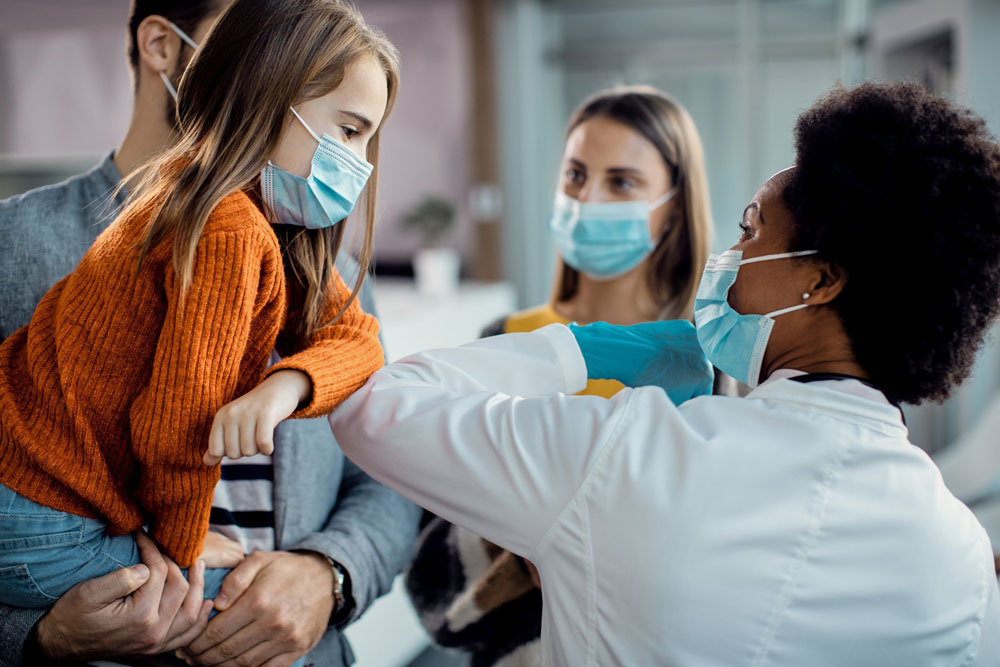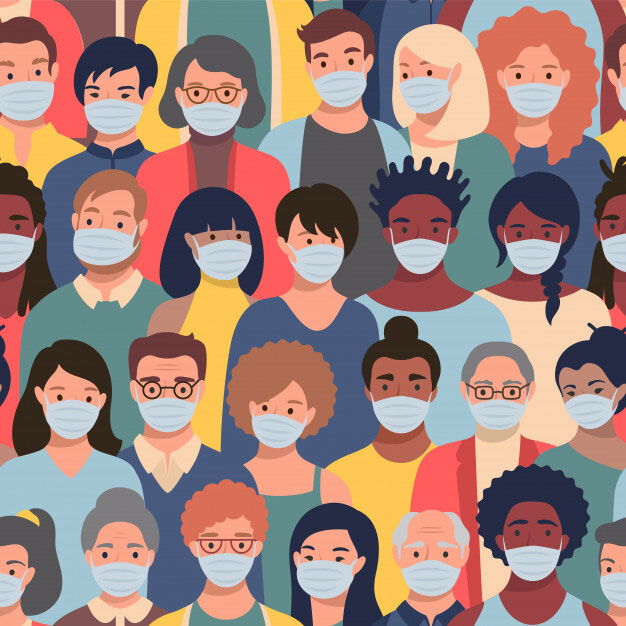COVID-19: Two Years Later
March 24, 2022

This month marks two years since the COVID-19 virus became a pandemic and changed the world as we knew it. In the last two years, BlueCross BlueShield of South Carolina’s medical experts have offered insight into the virus, vaccines and the pandemic’s impact on health.
We checked in with several of our doctors to discuss what we have learned in the last two years and what South Carolinians can expect in the months ahead.
Overall health
Dr. Nate Henderson, assistant vice president of Medical Affairs
Looking back on the pandemic, what do you think is the top takeaway?
One of the top takeaways is the health impact of our social networks. We learned the importance of true, in-person social contact with family, friends and colleagues. We have realized the consequence of isolation, leading to an increase in anxiety and depression as people are not able to participate in their usual activities.
Another top takeaway is the significance of preventive medicine and appropriate maintenance of chronic conditions. Keeping conditions such as hypertension, obesity and diabetes under tight control is so very important to help decrease risk of other health-related complications.
Are you optimistic about where things are right now with COVID-19?
We can’t predict the future, but the numbers are encouraging right now. We saw this happen before last summer, when the infection and hospital rates were low and everyone loosened up. Then we had new variants and things got worse again. I think, for now, we can be cautiously optimistic. We learned a lot from recent history. Stay vigilant, pay attention to national and local rates. South Carolinians should follow local guidelines from the South Carolina Department of Health and Environmental Control (SCDHEC)*.
Anything else people should think about right now?
If the pandemic has taught us anything, it is the importance of regular health screenings and checkups. South Carolinians should make sure they are up to date on immunizations and well-check appointments with primary care providers. It is important now more than ever to follow up on preventive measures and age-appropriate cancer screenings.
Minority health
Dr. Lena Bretous, associate medical director
How has the pandemic uniquely affected Black Americans and minorities?
The pandemic has widened the disparities in access to health care to include sharp increases in untreated mental health conditions, pregnancy outcomes, high blood pressure, high cholesterol and diabetes.
What have we learned about health equity during the pandemic?
Black Americans and other underserved minority populations had a pre-pandemic fear of the medical community not serving their best interests. The pandemic has heightened those fears. It has exposed increased untreated mental health conditions in Black Americans and underserved minorities. There is an underlying cultural barrier to mental health with much less treatment for these issues.
Looking ahead, what should people think about or be aware of in relation to minority health?
If you see medical, food security and mental health needs in any community, they are magnified in Black American and underserved minorities.
Mental health
Dr. April Richardson, psychiatrist and medical director
What effect has the pandemic had on individual mental health?
During the pandemic, many people experienced stressful and overwhelming events. The length of the pandemic has caused strong emotions in adults and children to last for months or years. Some of the precautions taken during the pandemic caused people to feel sad and isolated. Many people could not engage in the activities they found stress relieving prior to the pandemic, and some people experienced occupational stress. Because of this, depression, anxiety and substance use diagnoses have increased in both adults and children.
What do you want people to know about the pandemic and mental health?
Coping with stress in a healthy way can have an immediate effect, but many more people are experiencing anxiety, depression and substance use, even some who never had any history of those conditions before the pandemic.
Help is out there.
It can be very helpful to talk to your doctor or a therapist about what you are experiencing and how you are feeling. Also, don’t forget to check in on children. We are seeing increases in the prevalence of mental health conditions in children, and sometimes children have trouble identifying their emotions and need caregivers to ask questions.
Looking ahead, what kind of long-term impact will the pandemic have on mental health?
There has been a lot more interest in digital engagement for mental health treatment. Telehealth access has increased drastically. This can be a great way to fit therapy into your or a loved one’s schedule. We are seeing that people have been more interested in their health and wellness since the start of the pandemic. Most Americans now believe their health is more important than before the pandemic. Mental health is just as important as physical health. With this change in mindset about health and an increased focus on mental health, I hope more people seek treatment and find ways to handle stress in a healthy way.
Children’s health
Dr. Laura Valleni, associate medical director
What have we learned about the COVID-19 vaccine and children since it was approved for those ages 5 and up?
The Centers for Disease Control and Prevention (CDC)* now recommends the Pfizer-BioNTech COVID-19 vaccine for children ages 5 and older. Currently, Pfizer’s vaccine is the only approved COVID-19 vaccine for children. Clinical trials are underway for children 2 to 4 years of age, and it is expected that they will soon be eligible for vaccination.
Children with other health conditions, such as diabetes, asthma, immunodeficiencies, obesity, congenital heart disease and genetic conditions, may be at higher risk of serious illness if infected with COVID-19. No vaccine we have today is 100-percent effective, but we know the COVID-19 vaccination helps prevent hospitalization, severe illness, and short-term and long-term complications.
Vaccinating children eligible for the COVID-19 vaccine* protects others who are not yet eligible for vaccination and those who may be more susceptible to severe consequences of the infection. It also helps keep children in school and safely participating in sports, playdates and other group activities and helps slow the spread of COVID-19 in our communities.
The CDC recommends COVID-19 vaccination for everyone ages 5 years and older, including those who have already had COVID-19. Evidence shows people get better protection from the vaccine compared to the antibodies they get from having COVID-19. If you have any questions about the COVID-19 vaccine for your child, speak with a trusted health care provider. There is a lot of misinformation and confusion. It is important to have open and honest discussions with your child’s medical provider.
What impact has the pandemic had on children?
While it is too early to know the full impact the pandemic has had on children, it certainly caused uncertainty and disruptions in routines and social isolation for children and teens. Children and adolescents have experienced increased mental, emotional and behavioral health issues resulting from the pandemic.
The pandemic led to disruptions in schooling and drops in well visits to doctors, and many children got behind on routine immunizations.
The pandemic resulted in positive changes, as well. These include an increased focus on mental health; increased access to health care via telehealth; and a better understanding of the need to address disparities, inequities and social determinants of health among children and adolescents.
How can we address the consequences the pandemic has had on children?
It’s unclear what the long-term consequences of the pandemic will be on children. Many children demonstrated a great deal of adaptability and resilience during the pandemic, which may be qualities they carry with them into adulthood.
Much remains unknown about the extent of the mental health toll, long-term COVID-19 illness (long COVID), the full degree to which children are behind in school and what it will take to catch them back up. A multidisciplinary approach that includes families, schools, public health and health providers is critical for evaluating, supporting and addressing the health and well-being of children and adolescents.
*The CDC and SCDHEC are independent organizations that offer health information you may find useful.
Related Reading
 COVID-19 Update: Vaccines and Children
COVID-19 Update: Vaccines and Children
The U.S. Food and Drug Administration approved the first COVID-19 vaccine for children ages 5 – 11. Our chief medical officer, a pediatrician, gives an update on the state of the coronavirus pandemic and answers some questions parents may have about the vaccine.
Read More Pandemic Shines Light on Health Care Disparities
Pandemic Shines Light on Health Care Disparities
The coronavirus pandemic has highlighted the gap in health care outcomes and access to care faced by minorities. A recent report from a policy group in the state has highlighted the disparities communities of color face in light of COVID-19. BlueCross' Dr. Shawn Stinson serves on the board. He discusses the findings and why it is important the health care community address the issue.
Read More Drinking, Substance Use, Mental Health Issues Up During The Pandemic
Drinking, Substance Use, Mental Health Issues Up During The Pandemic
A recent study from the Centers for Disease Control and Prevention found increases in the number of Americans struggling with mental health conditions like depression, substance abuse and suicidal thoughts. BlueCross' Dr. April Richardson discusses the findings and ways to cope during the pandemic.
Read MoreCOVID Update
The COVID-19 public health emergency (PHE) ended May 11, 2023. The COVID-19 national emergency ended April 10, 2023. The standard terms of your health plan or policy now apply to any COVID-19 related services. Please review your schedule of benefits if you have any questions.



















